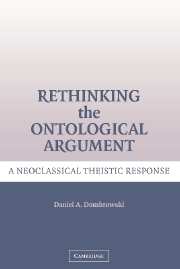Book contents
- Frontmatter
- Contents
- Acknowledgments
- Introduction
- 1 Historical Background
- 2 Poetry versus the Ontological Argument: Richard Rorty's Challenge
- 3 Deconstructionism and the Ontological Argument: The Case of Mark Taylor
- 4 Is the Ontological Argument Worthless? Graham Oppy's Rejection
- 5 Oppy, Perfect Islands, and Existence as a Predicate
- 6 Rival Concepts of God and the Ontological Argument: Thomas Morris, Katherin Rogers, and Alvin Plantinga
- Bibliography
- Index
Introduction
Published online by Cambridge University Press: 16 July 2009
- Frontmatter
- Contents
- Acknowledgments
- Introduction
- 1 Historical Background
- 2 Poetry versus the Ontological Argument: Richard Rorty's Challenge
- 3 Deconstructionism and the Ontological Argument: The Case of Mark Taylor
- 4 Is the Ontological Argument Worthless? Graham Oppy's Rejection
- 5 Oppy, Perfect Islands, and Existence as a Predicate
- 6 Rival Concepts of God and the Ontological Argument: Thomas Morris, Katherin Rogers, and Alvin Plantinga
- Bibliography
- Index
Summary
Three key moments in the history of the ontological argument can be identified. First, in the eleventh century St. Anselm stated the argument in an explicit way for the first time, or at least one could argue that this is the case. Second, in the eighteenth century the criticisms of the ontological argument by Hume and Kant struck what seemed to be the death knell of the argument. And third, in the middle decades of the twentieth century several thinkers - most notably Charles Hartshorne, Norman Malcolm, and John Findlay - breathed new life into the argument by claiming that Hume and Kant criticized only the weaker version of the ontological argument, found in Ch. 2 of Anselm's Proslogion, not the stronger modal version, found in Ch. 3. To be precise, Hartshorne is the one who discovered two versions of the argument in Anselm's Proslogion in 1953 (see Hartshorne 2000, 96-97). Seven years later Malcolm wrote his justly famous article (Malcolm 1960). Further, Hartshorne was the first to give a formalized version of the argument using the calculus of modal logic (Hartshorne 1961b; 1962, 50–51).
The present book is an attempt to assess the impact of this third key moment in the history of the ontological argument on contemporary philosophy. I should be clear at the outset that I think there are several versions of the ontological argument - both in ordinary language and formal versions - that are not only valid but sound.
- Type
- Chapter
- Information
- Rethinking the Ontological ArgumentA Neoclassical Theistic Response, pp. 1 - 6Publisher: Cambridge University PressPrint publication year: 2006

